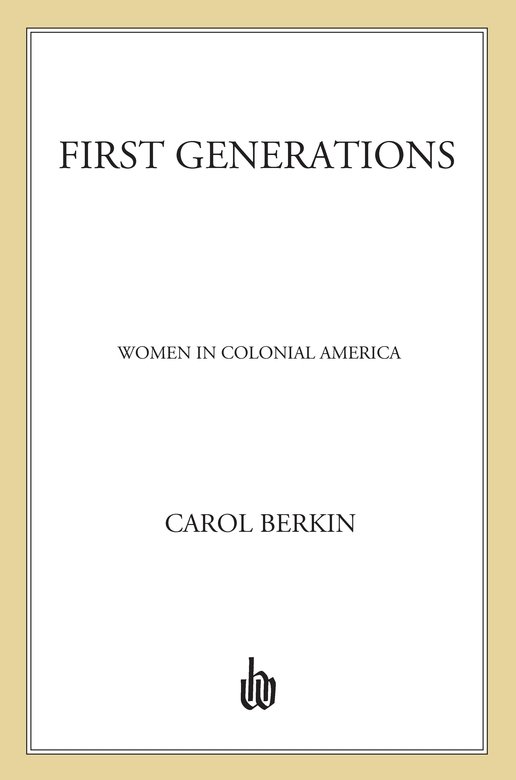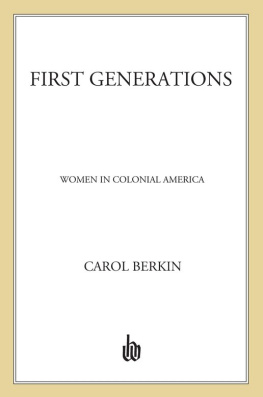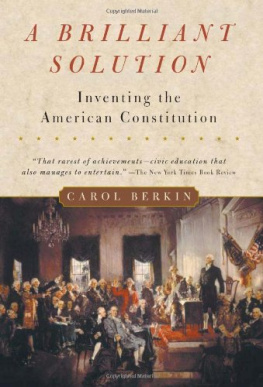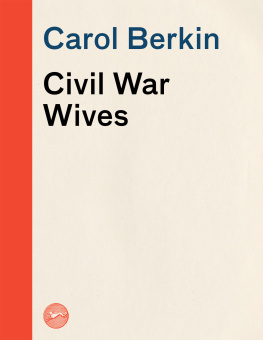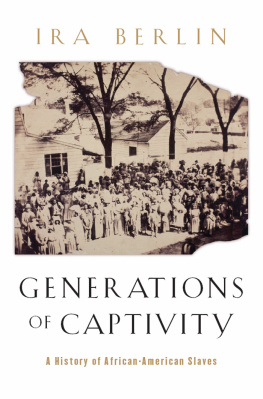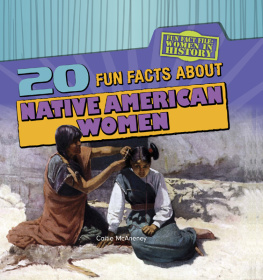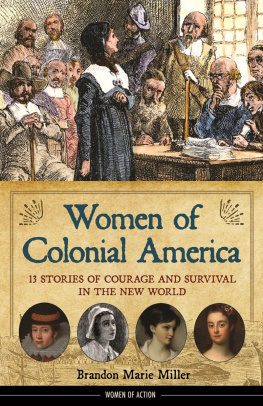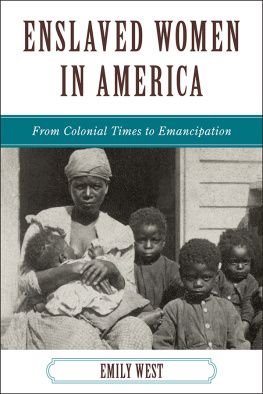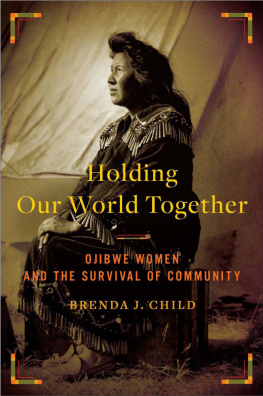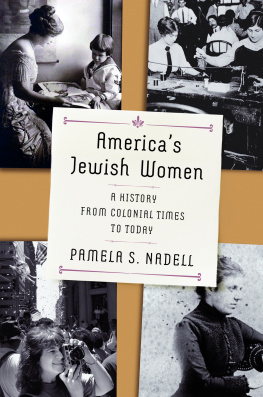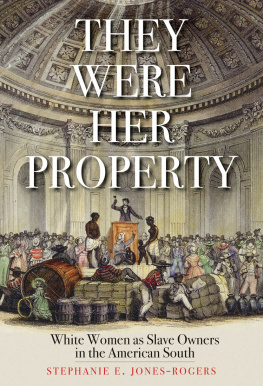FAIR DAUGHTERS OF COLUMBIA: WHITE WOMEN IN THE NEW REPUBLIC
T HE AMERICAN REVOLUTION ENDED in 1783. But for most ordinary Americans, war did not segue smoothly into peace. Economic crises, both regional and national, marred the first decades of the new republic. In New England, wartime markets for local farm products contracted and farm families found themselves struggling to meet mortgage payments. British restrictions on the American carrying trade brought New England shipbuilding to a standstill, leaving whole communities without livelihoods. In the nearby middle states, urban artisans and laborers were out of work and merchants struggled to collect the debts owed to them. In the Southern states, the devastation brought by two British campaigns and local civil war was evident everywherecrops had been ruined, barns and stables burned, and many white families suffered from the loss of their most valuable asset: slaves. Backcountry settlers remained braced for warfare despite the peace treaty with England, for they knew Indian resistance to American sovereignty was likely. These regional problems led one historian to call the postwar decades the critical period in American history. But many groups within American society had other crises to grapple with. For example, AfricanAmericans who had won their freedom through service to the military or in the emancipation programs that followed the Revolution in Northern states sought to establish their own community services and institutions and find employment in still-hostile environments. And in the West, Native Americans prepared for the inevitable encroachment upon their lands by white settlers. For some tribes this meant migration; for others, new warfare.
There can be little doubt that the immediate concerns of family. survival, of rebuilding, restoration, and creation of communities preoccupied most women and men in postwar America. Under these circumstances, did anyone stop to consider the impact of the war on womens roles in the family or in society at large? There were, of course, Americans who did. For if the postwar decades were a critical period in reconstructing the everyday life of Americans, they were also an era of sustained debate over many critical political and social issues, among them the structure of the national government, the definition of citizenship, the role of slavery in the new nationand the role women could and should play in a republic.
The women and men who took up the question of womens place in the new republic subjected customary assumptions about womens nature and womens role in the family and society to careful scrutiny. In speeches, sermons, novels, and essays, they reflected on the lessons of the Revolution for women of the next generation and argued the need for a new definition of womanhood suitable to a republic. This public discussion on women was intense, but it was relatively brief, and its impact is difficult to measure. Nevertheless, the arguments given voice by critics such as Susannah Rowson, Judith Sergeant Murray, Charles Brockden Brown, and Dr. Benjamin Rush tell us much about the legacy of the war. For if these critics did not speak for the majority, they addressed issues and analyzed ideas that were current and compelling in their society.
The women and men who chose to scrutinize gender roles and gender ideals came, not surprisingly, from the privilegedclasses. Educated, with time to devote to intellectual issues, they spoke for and of a womanhood they believed to be universal, although that womanhood was more often a reflection of their own social class. The social authorities to whom they addressed their arguments and with whom they debated or allied themselves were also members of the nations elite. This fact influenced, in subtle but evident ways, the problems they defined, the solutions they proffered, and the scope of the changes they envisioned. Nevertheless, their demand for reforms in the laws restricting married womens rights, their insistence on the rational capacities and intellectual potential of women, and their effort to create a political space for women in the new republic went beyond the boundaries of their own social position. When, for example, Abigail Adams pressed her husband and his colleagues in Congress to ameliorate the dependency of married women by extending their property rights, she may have been thinking of problems facing a woman of her own circlea lady. But had such reforms been implemented, their impact would have reached every level of the American social hierarchy.
These reformers began with the assumption that women, no less than men, were capable of reasoned, moral behavior and thought. In this, they were the daughters and sons of the Enlightenment, with its emphasis on human beings capacity to learn, to develop their intellect, and to refine their moral sense through nurturing instruction. From this assumption came an insistence that womens apparent intellectual inferiority and the frivolity or irrationality that opponents claimed to be innate were in fact the products of educational neglect. As Judith Sergeant Murray, a leading advocate of womens education, crisply put it: Will it be said that the judgment of a male of two years old, is more sage than that of a female of the same age? But as their years increased, the sister must be wholly domesticated, while the brother is led by the hand through all the flowering paths of science.
But if Enlightenment theory helped dispel the notion of womens natural limitations, experience proved an equally compellingbasis for their arguments. During the Revolution, women had shown themselves capable of political commitment, of patriotic action, and, in the nonconsumption of British goods, of political morality in eschewing luxury and abandoning frivolity. Thus, reformers arguments about womens capacities were made that much more convincing in light of their generations recent experiences.
Reformers drew heavily upon what they believed to be the lessons of the Revolution: the need for both sexes to be resilient, flexible, and equipped with the skills to survive in times of crisis. They did not stress, however, what many ordinary women frequently stressed in their wartime recollections: that the Revolution had proved women could rise to the occasion in crises and tap hidden resources and abilities. Instead, the reformers read the Revolution as a warning that women must be carefully prepared for a crisis before it occurred. As the novelist Charles Brockden Brown put it, the desire to prepare for the future reflected the common sense of a revolutionary era in which the unexpected was very likely to happen, in which large numbers of people had lived through reversals of fortune, encounters with strangers and physical dislocation.
How did Brown and his colleagues suggest that the survivors of one crisis prepare for the next? By nurturing personal independence. Yet if the reformers all agreed that independence was crucial, they did not always define it in the same manner. In her influential essays, collected in 1789 under the title The Gleaner , Judith Sergeant Murray defined independence in economic terms. I would give my daughters every accomplishment which I thought proper, she wrote, and to crown all, I would early accustom them to habits of industry and order. They should be taught with precision the art economical; they should be able to procure for themselves the necessaries of life; independence should be placed within their grasp. But others seemed to place less emphasis on practical preparation and more on the molding of a character that could withstand adversity. The dangers, they believed, lay in an upbringing that encouraged, or allowed, the developmentof a feminine character defined by frivolity, vanity, love of luxury, and reliance on charm and beauty. The antidote was a regimen encouraging such virtues as intelligence, good judgment, competence, economy, and modesty. Sometimes the formula called for both the practical and the moral. In works of fiction such as Charles Brockden Browns 1799 novel Ormond , for instance, the heroine survived the unexpected loss of her fathers fortune by an easy renunciation of every superfluous garb and trinket, coupled with a skill at needlework that allowed her to earn a meager but honest living.
